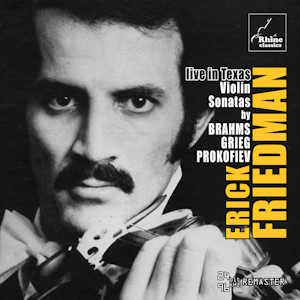
Erick Friedman (violin)
Live in Texas
Johannes Brahms (1833-1897)
Violin Sonata No.3 in D minor, Op.108
Edvard Grieg (1843-1907)
Violin Sonata No.2 in G major, Op.13
Sergei Prokofiev (1891-1953)
Violin Sonata No.1 in F minor, Op.80
Anne Epperson (piano: Brahms)
James Dick (piano: Grieg & Prokofiev)
rec. live, 2001, Concert Hall, Round Top Festival Institute, Texas, USA
Rhine Classics RH-031 [73]
Erick Friedman (1939–2004) began violin studies with Samuel Applebaum and later became a pupil of Ivan Galamian and Nathan Milstein, yet the violinist who had the most influence on his life was Jascha Heifetz, who he went to aged 17. The maestro extended the greatest compliment by asking him to partner him in a recording of the Bach Double Concerto in 1962. Apparently, Friedman started life as Eric and Heifetz encouraged him to add the k so that his name would have 13 letters like Jascha Heifetz and Fritz Kreisler. Heifetz actively discouraged his students from accelerating their careers by the lure of competitions. David Oistrakh encouraged him to enter the 1966 Tchaikovsky Competition in Moscow. Unfortunately, in a rancorous atmosphere of wheeling and dealing he only tied in sixth place. The negative impact of that temporarily sidetracked his career. Despite some early success, his star eventually waned and he took alternative paths into teaching and conducting. This was compounded by the fact that he was involved in a car accident in Texas in 1986, when he sustained injuries to his left arm and thumb and it took six years of rehabilitation before he could return to the concert stage. In 1989 he took up a teaching post at Yale, where he remained until his death from lung cancer in 2004, aged only sixty-four.
These live performance derive from two concerts given at the Round Top Festival in Texas in 2001. Friedman was there both to perform and give masterclasses. On 1 June he performed the Brahms Violin Sonata No.3 in D minor, Op.108 with Anne Epperson as pianist. The Sonata stands apart from the previous two in scale and dramatic intensity. Friedman plays it to the manor born, aided and abetted by the bold, large scaled pianism of Epperson. The Heifetz influence can be detected most strongly in the second movement Adagio where he employs expressive position changes and horizontal slides in the manner of the old master. However, his tone is somewhat leaner than Heifetz’s. The finale is a muscular reading and quite exhilarating. Needless to say, it garners some enthusiastic applause from the audience.
Two weeks later Friedman performed the Grieg and Prokofiev sonatas, this time partnered by James Dick. He chose Grieg’s Sonata No.2 in G major, Op.13. Heifetz made a wonderful recording of this particular sonata with Emmanuel Bay. The Sonata is more mature than the First Sonata, and it also sounds more Norwegian. Friedman and Dick deliver a striking reading which sounds improvised, with a wonderful sense of line and freedom. In the second and third movements they handle the folk-dance episodes very well indeed, capturing the Norwegian flavour to perfection.
The other work in their program is Prokofiev’s Sonata for Violin and Piano No. 1 in F Minor Op. 80. The work had a lengthy gestation period. The composer began writing it in 1938, and it was only finished in 1946. During this time the Second World War came and went, and the composer was afflicted with health problems. These momentous events inform the character and complexion of the work. It was premiered in 1946 by David Oistrakh and Lev Oborin, the violinist becoming its dedicatee. Friedman’s performance captures the dark, portentous and menacing opening. The brusque declamatory chords of the second movement have real bite and impact, with an almost mocking character. This invests the music with a coarse and angular feel. The Andante brings an element of calm to the proceedings. In the final movement, forceful drama gives way at the end to resignation.
This release is a fine addition to the label’s violinistic roster. The recordings have been restored and remastered in expert fashion. Gary Lemco has provided an interesting liner.
Stephen Greenbank
Availability: Rhine Classics


















